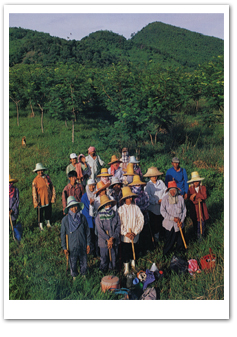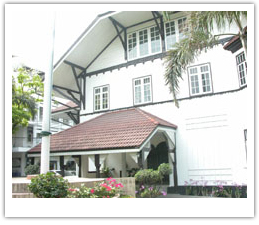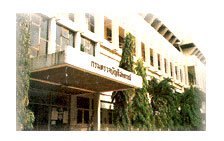|
|
|
|
|
|
|
|
COOPERATIVE IN |
|
|
Cooperative is considered as mean to promote the people’s own development efforts, especially to raise the economic condition of the farming population. Cooperative in
26th February, 1916 is regarded as the birthdate of cooperative movement in
The Cooperative Societies Act of B.E. 2471(1928) was promulgated in 1928 for the further development of cooperatives of various types, then in 1932 other types of cooperatives were established such as land settlement, consumer, fisheries, hire purchase, marketing and processing, land improvement, thrift and credit cooperatives. In 1968, the Cooperative Societies Act of B.E. 2511 (1968) was promulgated by repealing the Cooperative Societies Act B.E.
As the cooperative movement in
(a ) The Office of the Registrar of Cooperative Societies with the function of registration, liquidation, and supervision of cooperative societies accordance with the cooperative law.
(b) The Cooperative Promotion Department responsible for the survey and establishment, promotion and guidance of cooperation societies in order to enable them to carry out their business activities accordance with cooperative regulations.
(c) The Cooperatives Auditing Department (CAD). Its function comprises both cooperative auditing and practical guidance in the field of financial and accounting management to cooperatives.
The cooperatives in
Primary cooperative – at local level
Provincial federation – at provincial level
National federation – at national level
All types of cooperative at all level have to be affiliated to the cooperative league of
At present, there are 7 types of cooperative in
1. Agricultural Cooperative
2. Land Settlement Cooperative
3. Fisheries Cooperative
4. Consumer Cooperative
5. Thrift and Credit Cooperative
6. Service Cooperative
7. Credit Union Cooperative |
|
|
Cooperative Auditing Department |
|
| In The cooperative auditing activity was first performed by the auditing officers in the Cooperative Section, Department of commerce and Statistic Forecast, Ministry of finance in 1916. Later on 12th March 1952, the cooperative Auditing Department was established under the Ministry of Agriculture and Cooperatives and it is the only institution to audit all types of cooperative societies in the Kingdom. In the past, all the auditing officers of the cooperative Auditing Department were stationed in a. To provide regular counselling for the accountants of cooperatives and farmer groups. b. To shorten the time between the end of financial year and date of certification by the auditors. c. To provide more update information for management purpose. d. To assist in strengthening the internal control system of cooperatives and farmer associations. e. To facilitate immediate information for government official in charge of supervising the cooperatives and farmer associations concerning any irregularity which have occurred and require prompt action. |
|
ORGANIZATION AND FUNCTIONS |
| The cooperative Auditing Department, headed by a director general and assisted by two deputies, is structured into 10 Regional Cooperative Auditing Offices and 76 Provincial Cooperative Auditing Offices at level and 6 divisions at headquarters with the following functions: 1. To provide auditing to all types of cooperatives and farmer groups in accordance with the Cooperative Act. 2. To prescribe suitable accounting systems for cooperatives and farmer groups. 3. To provide regular advice in accounting and financial matters and internal control to cooperatives and farmer groups and also to, observ whether internal control is as efficient as possible. 4. To provide training in finance and accounting for cooperatives’ and farmer groups’ members, staff and board members. 5. To regulate the cooperative auditing by private auditors. 6. To provide report on financial position and economic situation of cooperatives and farmer groups. 7. To perform additional activities to support the government policy. Function of Regional Cooperative Auditing Office: - Providing training courses for cooperatives’ grass-root members, committee members and managers. - Supervising the performance of provincial Cooperative Auditing Offices. - Performing other activities to support the Ministry of Agriculture and Cooperative and the government policies
Function of Provincial Cooperative Auditing Office: - Auditing all types of cooperative and farmer groups in every province. - Providing regular counselling for cooperatives’ bookkeepers and managers in accounting and finance. - Providing training and counselling in basic accounting to the farmer under the Royal project and government project ,such as the Small and Micro Community Enterprise(SMCE), Agricultural Mobile Unit, The One Tambon One Product project (One Village One Product Project) etc.
|
|
COOPERATIVE AUDITING ACTIVITIES |
|
Advisory Service To enable the main objective of upgrading the capacity of agricultural cooperative’ staff to be attained, it is essential for the CAD’ s auditing officials to carry out a monthly Advisory Service for staff of cooperatives and farmer groups. The service provide intensive and closely advise to cooperatives’ bookkeepers and accountants to record bookkeeping in correctness and able to prepare their own financial statements. Interim Auditing The interim auditing is conducted during the financial year of the cooperative which aims to check the correctness of bookkeeping, observe whether the internal control is as efficient as possible and to assist and guide the cooperatives to update and complete their book of account. The interim auditing is provided for the agricultural cooperatives which are not given advisory service and the large size of thrift and credit cooperatives, consumer cooperative and the cooperatives with internal control problems. Annual Auditing In accordance with The Cooperative Act, the accounts of all cooperatives and farmer associations must be audited annually by the Cooperative Auditing Department’ s auditors, appointed by the Registrar. The auditing activity performs both in financial auditing and management auditing, as follows: a. The financial auditing consists of certifying the formal correctness and reliability of information concerning the financial status on the date of auditing. The certification is based upon auditing standard prescribe by the Registrar. These standards are in accordance with those set up by the Association of Certified Accountants and Auditing of Thailand. b. The management auditing refers to: 1. The assessment of financial and accounting management. 2. The provision of assistance in correcting mistakes and improving the related management skill. 3. The evaluation of the business performance of the cooperative and farmer groups. Private Cooperative Auditing Under the promotion of the government, the establishment of cooperatives, especially agricultural cooperatives, has been increasing every year, whereas the manpower to conduct the auditing has a constantly number and it has been a heavy task and big burden for the CAD officials to perform the duties. So, in order to solve this problem, CAD has private auditors to relieve the audit work load. It has been defined that the consumer cooperatives, thrift and credit cooperatives and service cooperatives with at least 90 million Baht of total assets can be annually audited by private auditors (Private Certified Public Accountants) while the cooperatives with total assets less than 90 million Baht are audited by CAD auditors. These private auditors must registered at Cooperative Auditing Department and their auditing performances are regulated by CAD. | ||
| ||
| ||
|
Mission | ||
| ||
| Purposes and Indicators | ||
| ||
| ||
| Strategies | ||
|
|
Êӹѡ§Ò¹µÃǨºÑªÕÊˡóì¡ÒÌÊÔ¹¸Øì 3/1 ¶.àÅÕè§àÁ×ͧ·Øè§Á¹ Í.àÁ×ͧ ¨.¡ÒÌÊÔ¹¸Øì 46000 â·Ã.0-4381-2083 á¿¡«ì.0-4381-5365 http://kalasin.cad.go.th E-Mail : [email protected]
|












